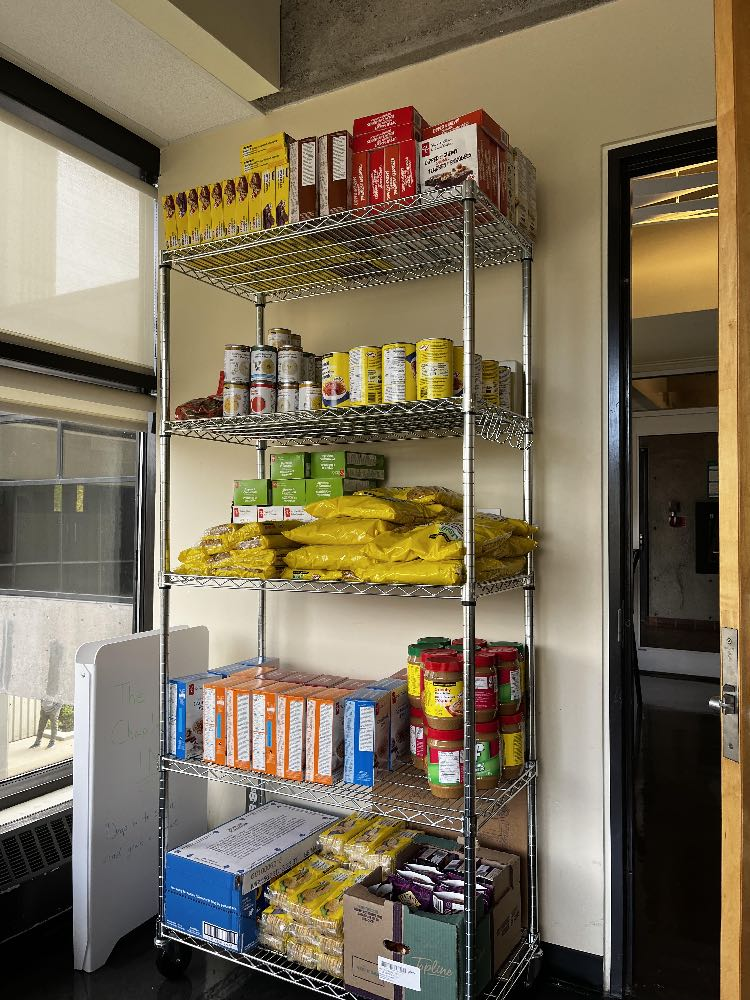When the Rev. Michael Garner began volunteering at the multi-faith chaplaincy office at the University of Ottawa in 2022, he was surprised by the number of students he met who were coping with food insecurity.
Doing some more research over that summer, he was told that use of the student-run food bank on campus had increased far beyond its capacity, and its office often ran out of food mid-week, even though students are limited to going there once a month.

“The chaplaincy office exists in the mental health and wellness area of the university, which is great, but it’s hard to talk about mental health and wellness if you’re starving,” he told Crosstalk.
Before the pandemic, St. Albans had been a part of a long-running ecumenical project with the United and Presbyterian churches called Open Table, in which the churches hosted a meal for students once a month. That ended when they could no longer gather during the pandemic, but with a bit of the leftover funds, St Albans created a food cupboard in the chaplaincy office and promoted awareness of it by giving away boxes of macaroni and cheese in the first week of school last fall.
Garner says the food cupboard in the chaplaincy office is stocked with non-perishable items such as canned beans, lentils, tomatoes and pasta, oatmeal, crackers and peanut butter. “There are two challenges. One is making students aware. Two, it’s overcoming the feeling of shame…. If you’re a second-year student, and you’re in what’s supposed to be the best time of your life and you’re having to go to a food bank…..It’s a challenging time.” One of the first people who came to get some food from the cupboard was a graduate student from Senegal who was living at the Shepherds of Good Hope shelter,” he said.
Garner also met with the head of residences for the university, learning that while many students live in residences with meal plans, there are five buildings where the students are responsible for providing their own food, and many of those students are in those residences because the meal plans are beyond their means. He asked if it might be possible for St. Albans to host a meal in one of the residences for students without meal plans, and was pleasantly surprised when her answer was ‘absolutely.’
So now, bolstered and supported by a $5,000 grant from the Anglican Foundation, St. Albans is planning a pilot project, hosting a meal once a month for any students living in the residences without meal plans in January, February and March. Residence staff told Garner to be prepared to feed about 150 students.
“The Anglican Foundation of Canada (AFC) is pleased to support St. Alban’s in this multi-faith chaplaincy initiative benefiting students at the University of Ottawa. AFC has a history of supporting ecumenical campus ministry projects across Canada, and to see a new project come from our 2023 RFP Viriditas is deeply rewarding,” said AFC executive director Scott Brubacher.
If the pilot project goes well, Garner hopes to expand to a weekly program next year. St. Albans would seek partners who could host one meal per semester. The partners don’t need to be Anglican, he said. “It could be another Anglican church, that would be lovely, or it could be a synagogue or a mosque, … and through the Open Table we have some links to the United Church and the Presbyterian Church, so hopefully we can talk to them.”
Garner also began some advocacy work on this issue. As an alumnus of the University of Ottawa, he received an invitation to the alumni association annual general meeting, decided to attend, asked a question and was able to share what he had learned about student food insecurity. “The Alumni Association [members] were totally unaware, just like I had been totally unaware,” he said. Discussions with the alumni association since have led to plans for them to fund another food pantry somewhere on campus, but Garner has also suggested that the association could get involved with bigger projects such as a breakfast program for students.
“The problem … is not unique to Ottawa U. It’s pervasive on campuses,” said Garner. “My hope is that there’s a bigger alumni movement….For any of the myriad of issues facing our communities, we need to work in networks…. We can’t solve the student hunger problem, but we can advocate, and we can get some momentum and then bring in other people alongside.”


Week of Prayer for Christian Unity annual service to be celebrated at Saint Paul University on Jan. 22